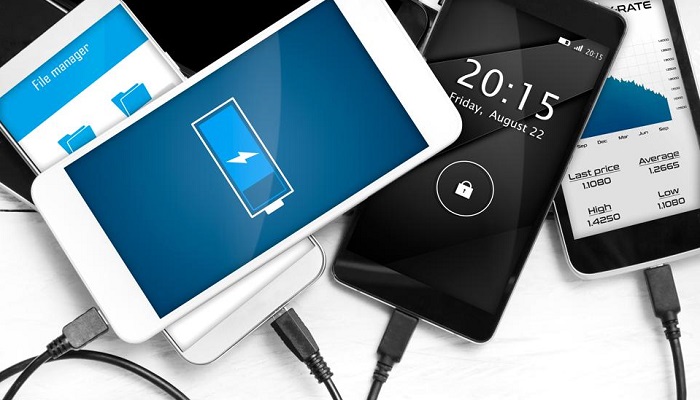In this article, you will know how long you are expected to charge your brand-new mobile phone before the first usage.
Charging your new phone battery correctly is crucial for ensuring its longevity and optimal performance.
With various myths and misconceptions surrounding the initial charging process, it’s essential to understand the best practices for maintaining your phone’s battery health from the start.
There is this popular saying that you have to charge your new phone for up to 6 – 8 hours before using it.
Understanding Modern Phone Batteries
Types of Phone Batteries: Most modern smartphones use lithium-ion (Li-ion) or lithium-polymer (Li-po) batteries. These batteries are preferred for their high energy density, lightweight nature, and relatively long lifespan.
How Lithium-Ion Batteries Work: Lithium-ion batteries store and release energy through chemical reactions. They do not suffer from the “memory effect” seen in older battery types, meaning they don’t need to be fully discharged before recharging.
Do You Need to Charge a New Phone Battery Before Use?
Manufacturer Recommendations: When you buy a new smartphone, the battery usually comes partially charged. Manufacturers often recommend charging the battery to 100% before using the phone for the first time to ensure full capacity.
Initial Charging Myths: A common myth is that new phone batteries need to be charged for 8-12 hours before first use. This is outdated advice stemming from older battery technologies. Modern lithium-ion batteries do not require such extended initial charging.
Don’t charge a new phone for 8 hours
I don’t think you would believe that. Are they saying that even if my phone gets filled up, I should still be charging it?
Let me break it down here.
Charge your new phone for however long you wish to; you can even start using it at whatever battery level that came with it. There is no adverse effect of not doing a full charge on your new phone battery.
Phone battery manufacturers recommended way back as at the time when NiMH batteries were in use. These batteries had specific requirements when it came to charging and discharging.
Using the NiMH batteries you have to give it several hours of charge, just as they said! 6 hours to 8 hours.
But those requirements do not apply to Lithium-ion batteries, also known as Li-ion batteries, which are the current battery technology.
There are lots of misconceptions about batteries of different chemistry, as well as battery safety.
However, with the new Lithium-ion batteries aka Li-ion batteries, all they need for charging several hours has been negated.
With Li-ion batteries, you can start even using the device battery right away, immediately after unboxing it.
Even if the cells are partially charged, or even as low as 40%. Feel free to use it, as it does not affect the battery. But just don’t let it get so low and trip off by itself.
When a phone battery gets very low, let about 5%, if you are not close to a power source, then switch it off. If trips off by itself – it may not be healthy for the phone.
All Li-ion cells go through a formation stage immediately after production, to make sure the electrodes are working Perfectly by doing a full charge on them.
It is also to “activate” all of the chemical components in that battery to be ready. As a result of this, the chemicals are all primed to start operating without any further preparation.
This means that there are no adverse effects of not giving the new phone battery a full charge.
Best Practices for Charging a New Phone Battery
First Charge Duration: For your new phone, it’s sufficient to charge it until it reaches 100%. This initial charge ensures that the battery’s charge cycle starts correctly. Typically, this process can take a couple of hours, depending on the phone model.
Avoiding Overcharging: Modern smartphones are designed to stop charging once they reach 100%. However, it’s still a good practice not to leave your phone plugged in for extended periods, such as overnight, to avoid any potential battery stress.
Battery Calibration
What is Battery Calibration? Battery calibration involves fully charging the battery to 100% and then letting it drain completely to 0% before recharging it again. This process helps your phone’s battery indicator to display the correct battery level.
Steps to Calibrate Your Battery:
- Fully charge your phone to 100%.
- Use your phone normally until it shuts down due to low battery.
- Recharge your phone to 100% without any interruptions.
Extending Battery Life
Tips for Maintaining Battery Health:
- Avoid extreme temperatures, both hot and cold.
- Use the charger that came with your phone or a certified replacement.
- Charge your phone before it drops below 20%.
Daily Charging Habits: Aim to keep your battery level between 20% and 80% for optimal health. Frequent full charges and discharges can shorten the battery lifespan.
Common Mistakes to Avoid
Charging Overnight: Leaving your phone plugged in overnight can expose the battery to prolonged periods of high voltage, which can degrade its capacity over time.
Using the Wrong Charger: Always use the charger recommended by the manufacturer. Using incompatible chargers can lead to inefficient charging and potential battery damage.
Conclusion
We do not need to keep charging our new device battery for obscene amounts of time just for it to last us a day. As long as the phone or whatever device has a Lithium-ion (Li-ion) battery, we are good to go.
Properly charging your new phone battery is key to maintaining its health and performance. While modern batteries do not require extensive initial charging, following best practices such as avoiding extreme temperatures, using the correct charger, and not overcharging can significantly extend your battery’s lifespan.
RELATED POSTS


